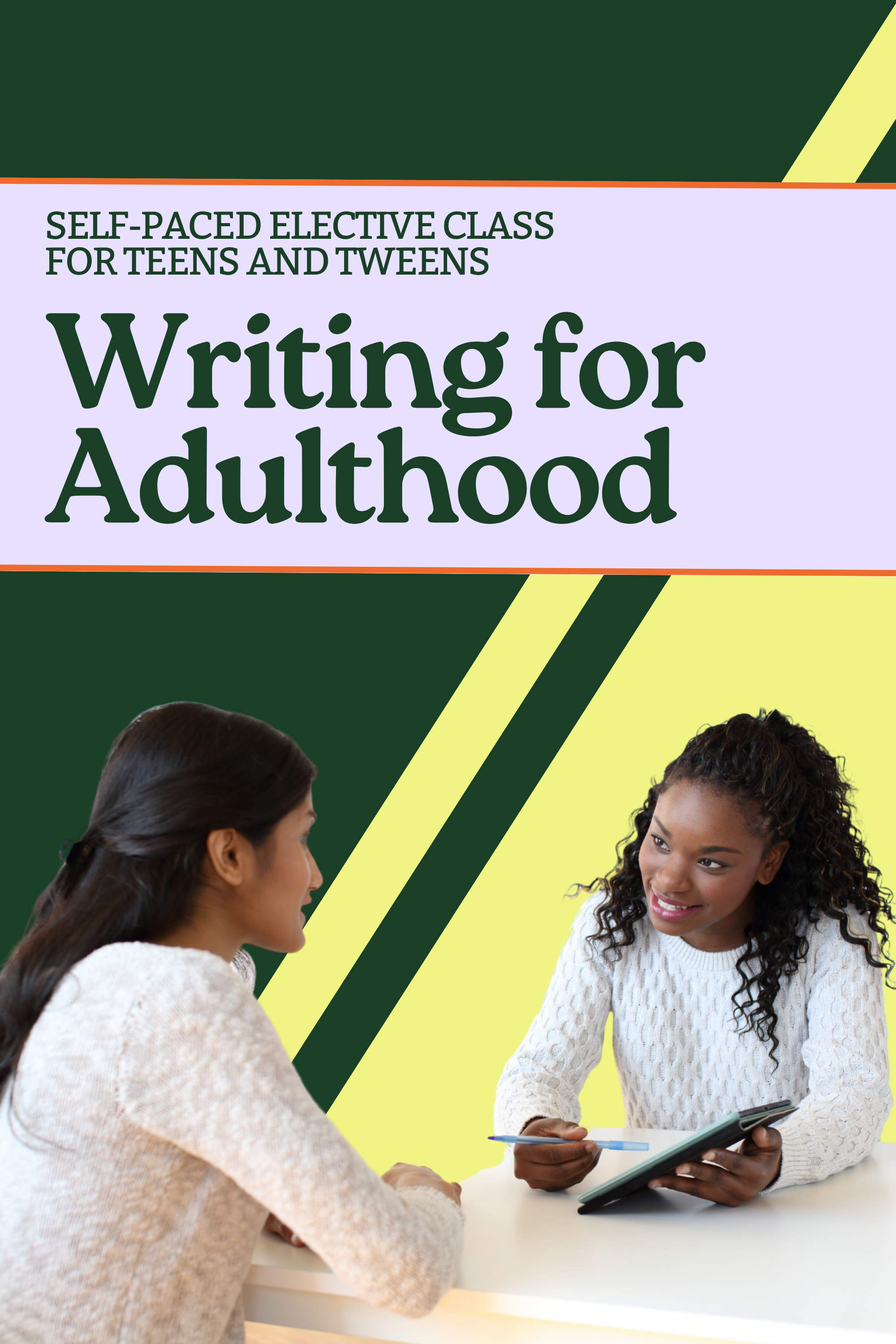A semester-long online class for ages 12-18
Writing for Adulthood

Class Details
This practical, real-world writing course equips teens with the essential writing skills they'll need in adulthood!
Ages: 12–18
Length: 12 weeks
Time Commitment: 1 hour/week
Format: Asynchronous online course
Cost: $197
Start Date: Summer Semester runs June 1 - August 17, 2026
What’s covered in class:
Each week includes:
A practical lesson on a real-world writing task—emails, bios, applications, and more
A writing challenge that mirrors an adult communication scenario
Personalized teacher feedback to help students sound confident and capable
Over 12 weeks, students will:
Learn how to write thank-you notes, apologies, resumes, and decline emails with purpose and clarity
Practice adapting tone for different audiences—professional, friendly, assertive, polite
Build confidence in communicating with adults, employers, and institutions
Develop a toolkit of reusable phrases and templates for real-life situations
Finish the course with a writing portfolio they can actually use in the real world
Who it’s for:
This class is a perfect fit for:
Teens (typically ages 14 – 18) who are eager to build real‑world writing skills for adulthood
Young writers ready to go beyond school assignments and learn professional forms like cover letters, resignation emails, and meeting follow‑ups.
Students who want more independence—join at any point in the 12‑lesson cycle and work at your own pace.
Senior high school age students planning to enter the workforce or apply for college who want confidence in polished, clear adult communication
How it works
Log in to our Google Classroom each week to explore a new real-world writing skill—cover letters, bios, emails, and more.
Do a quick warm-up activity to compare examples and spot what works.
Write your own version using a clear, creative prompt that makes the task feel doable (and maybe even fun).
Get thoughtful, encouraging feedback from a professional writer who’s rooting for your success.
By the end of 12 weeks, your teen will have a practical writing toolkit they can actually use—plus the confidence to handle adult communication with clarity and style.
And if they need a little extra help? No stress. The teacher offers weekly Zoom office hours where students can drop in, ask questions, and get face-to-face support.
What parents are saying about WordPlay…
Weekly Schedule
Week one: Writing a Cover Letter
Students learn how to introduce themselves with confidence, tailor their skills to a specific opportunity, and strike the right tone for professional outreach.
Week two: Writing to Request a Raise
Writers practice advocating for themselves clearly and respectfully, using evidence, tone, and timing to make a compelling case.
Week three: Writing to Request a Donation or Resources
This week focuses on persuasive writing with purpose—how to connect emotionally, explain a need, and inspire generosity.
Week four: Writing a Letter of Complaint
Students learn how to express dissatisfaction effectively—firm, professional, and solution-oriented, not aggressive or vague.
Week five: Writing a Resignation Letter
Writers explore how to leave a job or opportunity on good terms, using grace, gratitude, and professionalism—even if the experience was tough.
Week six: Writing to Follow Up After a Meeting
This week covers the importance of follow-through: students practice clarity, next steps, and tone in post-meeting emails and notes.
Week seven: Things You Shouldn’t Do in Writing
Students dig into common mistakes and missteps—vagueness, passive aggression, tone mismatches—and learn how to avoid them.
Week eight: Writing to Apologize
Writers explore sincere, effective apologies, learning how to take responsibility, express empathy, and avoid defensive or dismissive language.
Week nine: Writing a Thank You Note or Letter of Appreciation
This week centers on positive connection—students learn how to write thoughtful, specific, and memorable thank-yous.
Week ten: Writing to Decline a Request or Say “No”
Students practice setting boundaries with respect, clarity, and kindness—skills that are often harder than saying yes.
Week eleven: Professional Writing in Email and Text Form
Writers explore how tone shifts across platforms, and when it’s okay to use casual formats like text—plus how to keep it professional when needed.
Week twelve: Writing to Argue
Students finish strong by learning how to write a clear, respectful argument—using evidence, empathy, and purpose-driven persuasion.
Plus, access to weekly teacher office hours, where the teacher is available to meet with your child live via Zoom for additional support!
Ready to write?
Click below to enroll for Summer 2026 in the Writing for Adulthood class—your writer’s next adventure starts here!
FAQs
-
Not at all! Enroll your learner in whatever class seems the best fit for them, regardless of age. The recommended ages are merely our way of generalizing who the class was designed for.
-
Nope! Though we do recommend starting with the beginner levels— even if your learner is an avid writer— this is a recommendation, not a requirement.
-
Probably! WordPlay is officially ESA eligible in Arizona, Utah, Florida, New Hampshire, Alabama, North Carolina, Arkansas, and West Virginia. If your state isn’t listed or your charter requires additional paperwork, just reach out— we’ll do everything we can to make it happen for you.
-
Great observation—and you’re right! We believe middle schoolers are ready for real storytelling tools, especially when those tools are taught in a fun, accessible way. While concepts like subplots, voice, or symbolism may sound advanced, we break them down with clear examples, playful activities, and guided prompts.
Our goal isn’t to pressure students to write “perfect” stories—it’s to give them new ways to think, explore, and express themselves. Many students surprise themselves with what they’re capable of when given the right support and encouragement. Plus, each assignment comes with personalized feedback to help students grow at their own pace.
